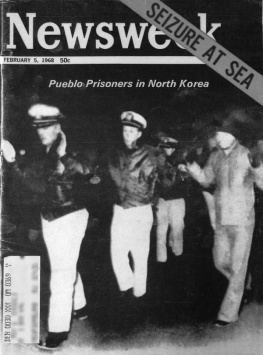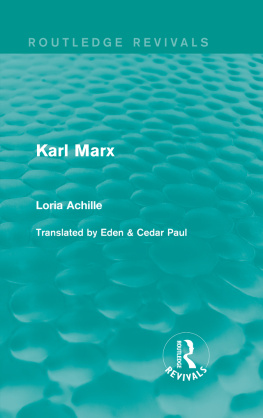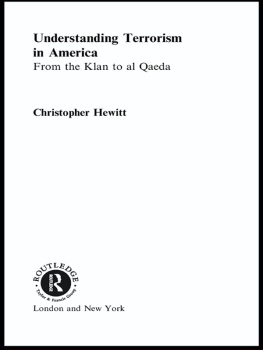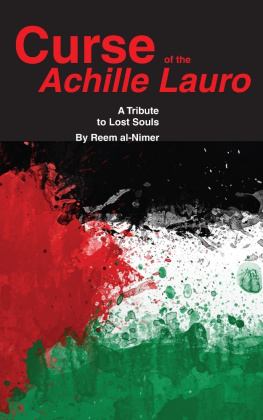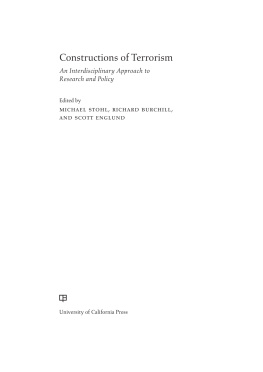THE
ACHILLE LAURO
HIJACKING
Also by MICHAEL K. BOHN
Nerve Center: Inside the White House Situation Room
THE
ACHILLE LAURO
HIJACKING
LESSONS IN THE POLITICS AND
PREJUDICE OF TERRORISM
MICHAEL K. BOHN

Copyright 2004 by Michael K. Bohn
Published in the United States by Potomac Books, Inc. (formerly Brasseys, Inc.). All rights reserved. No part of this book may be reproduced in any manner whatsoever without written permission from the publisher, except in the case of brief quotations embodied in critical articles and reviews.
Library of Congress Cataloging-in-Publication Data
Bohn, Michael K.
The Achille Lauro hijacking : lessons in the politics and prejudice of terrorism / Michael K. Bohn.1st ed.
p. cm.
Includes bibliographical references and index.
ISBN 1-57488-779-3 (alk. paper)
1. Achille Lauro Hijacking Incident, 1985 2. TerrorismMediterranean RegionCase studies. 3. ItalyPolitics and government1976-1994. I. Title.
HV6433.M4B65 2004
364.1540916387dc22 2004006728
ISBN 1-57488-780-7 (paperback)
Printed in the United States of America on acid-free paper that meets the American National Standards Institute Z39-48 Standard.
Potomac Books, Inc.
22841 Quicksilver Drive
Dulles, Virginia 20166
First Edition
10 9 8 7 6 5 4 3 2 1
To the families of
Alex Odeh and Leon Klinghoffer
CONTENTS
ACKNOWLEDGMENTS
THE idea of writing this book came from my friend Gene Gibbons, the long-time White House correspondent for UPI, then later Reuters. Gene covered the White House when I served on the National Security Council staff as the director of the White House Situation Room during the Reagan administration.
I am indebted to Sarah Flynn for her inspired editorial guidance, and clear strategy for the structure and tone of the book. Thanks also to Rick Russell and Sam Dorrance at Brasseys, Inc.
I want to thank a unique group of Naval officers who not only helped capture the Achille Lauro hijackers, but also took the time to recall their memories of the incident: John Poindexter and Jim Stark, who were at the White House at the time of the hijacking, and Ralph Zia, Skid Massey, and Steve Weatherspoon, pilots who were on board USS Saratoga.
In addition, thanks to several people who contributed time to the projectNick Veliotes, Rodney Gould, Peter Kohler, Bob Collins, Buck Revell, Alberto Negrin, and Jack Shaheen.
I am grateful for the help from Sami Odeh, brother of the late Alex Odeh, and Lisa and Ilsa Klinghoffer for their thoroughgoing assistance. May God bless Alex Odeh and Leon Klinghoffer. Finally, thanks to my wife Elin for her love and support.
PROLOGUE
ON November 1, 2001, the United States was still reeling from the extraordinary terrorist attack on America fifty days earlier. Smoke and steam continued to rise from the smoldering heap of rubble that was once the twin towers of the World Trade Center in New York City. At the Pentagon in Washington, DC, Department of Defense personnel were back at work, with many still haunted by memories of the blast, fire, and smoke. At nearby Reagan National Airport, flight operations remained suspended.
U.S. military forces were attacking the Taliban in Afghanistan in retaliation for its support of Osama bin Laden and his Al Qaeda terrorist organization. Americans were worrying about biological warfare as a fourth person died from exposure to anthrax in the postal system. The Justice Department held dozens of people who appeared to have connections to past and future terrorist attacks. Olympic officials were considering enhanced security at the Winter Games scheduled for the following February in Salt Lake City, Utah.
On the first day of November, Americans still seemed to be in withdrawal from their lives before 9-11, a retreat to the basicsfamily, friends, jobsat the expense of leisure activities, travel, and entertainment that just felt inappropriate at that time. That withdrawal triggered aftershocks throughout the social and economic fabric of the country. One area, the entertainment industry and the arts, reflected the publics retreat to comfort zones.
Viewers could not retreat from terrorism on televisionthats where the attacks took placebut in theater, Ground Zero seemed to reach all the way to Broadway in New York City. Hollywood producers and studios reassessed the appropriateness of both future production and finished films about to be released. People within the industry were questioning not only the propriety of traditional movie subjects such as romantic comedies set in Manhattan and police thrillers, but flat out cancelling anything connected to terrorism. Producers delayed indefinitely the release of a film titled Big Trouble, which includes the concealment of a nuclear weapon aboard an airliner. Collateral Damage, Arnold Schwarzeneggers new movie about a fireman avenging the killing of his family by terrorists, went immediately back in the can, to be released in 2002 as Hollywood gradually recovered.
Mark Volpe, the managing director of the Boston Symphony Orchestra, announced on November 1 that he had cancelled the scheduled performance of the choruses drawn from the opera The Death of Klinghoffer. Volpe cited excerpts from an opera about a terrorist act right now.
Superficially, that reasoning seemed consistent with delaying the release of movies with terrorist themes. Composed by John Adams and written by librettist Alice Goodman, the opera tells the story of the 1985 hijacking of an Italian cruise ship, Achille Lauro, by four young Palestinian men. They brutally murdered one of the passengers, a Jewish-American named Leon Klinghoffer, while his wife and other hostages were held at gunpoint. But that was not the only reason for the cancellation.
The opera did not demonize the hijackers. In an extraordinary shift from American social and entertainment norms, The Death of Klinghoffer featured choruses and arias that focused on the other side of a violent act. The performers in the hijackers roles sang of their feelings, their dreams, and their yearning for a free Palestine. Filled with rage over the horrific 9-11 attacks, few Americans were interested in any work of art that treated terrorists as anything other than despicable murderers. The Boston Symphony seemed to think that, too, but others disagreed. The debate over the politics of the opera took center stage.
present this story as a simple matter of good vs. evil, wrote Richard Dyer in the Boston Globe after the performance was cancelled. The opera does not condone terrorismfar from it. But it does say that terrorists are real people with inner lives, and that they are the result of the convergence of a specific set of historical and personal circumstances, just as the rest of us are.
, derivative, and hopelessly confused. Other critics skipped artistic matters and declared Adams, Goodman, and director Peter Sellars to be prejudiced against Jews.
in the libretto in an anti-Arab vein to match the repulsive anti-Semitism that drools from the mouth of a character called Rambo, wrote Raymond Sokolov of the Wall Street Journal. He saw no balance in the production and found the operas portrayal of Jews and Palestinians to be obnoxious, characterizations that cast the Klinghoffers as trivial suburbanites, while the assassins acted out the righteous anger of their oppressed brethren.
Next page

